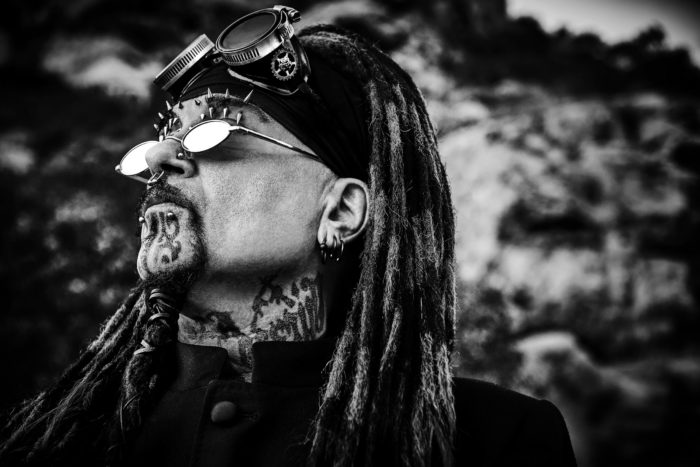
“We just adapted to the circumstances that we were in and we still made what I think is a pretty relevant album.”
There are bands and musicians who are considered forerunners, innovators, and pioneers, and then there’s Ministry, who literally created their own style of music during the ’80s. Their blend of synthy new wave and raw heavy metal is known these days as industrial, and with a rotating cast of musicians Al Jourgensen has kept things interesting for nearly half a century.
The staying power is evident throughout the band’s 15th album, Moral Hygiene, which packs a consistent display of fluidity within Ministry’s sound. As part of their Industrial Strength Tour in support of the project, Jourgensen and his crew will take the stage at House Of Blues in Boston on March 15. The bill will be stacked with Seattle sludge icons the Melvins and Raleigh, North Carolina metal badasses Corrosion Of Conformity rounding out the show.
Jourgensen and I spoke about making the new album in an unconventional way, art’s ability to adapt during the COVID-19 pandemic, having some friends get involved in the making of the record, a few anniversaries for the band, and refusing to be bored.
Moral Hygiene was self-recorded at your home-built studio during the height of the COVID-19 pandemic and it’s very much inspired by what 2020 brought along with the virus in terms of social justice, civil unrest, police brutality, conspiracy theories, and the list goes on and on. What was the experience like recording the album while being cooped up at home and how were you able to process what was going on in the world during that year into your music?
It was an interesting thing since you were literally under quarantine. Everything was strange about it but I think it actually worked to my advantage in a sense that we had just got done building the studio in the house, it was fully operational and then bam! The pandemic hit that March and there was really nothing else to do. It was almost like forced confinement but after a while it was great. I’m very blessed that I have this studio here while nothing else was going on and I wasn’t going anywhere. As soon as I got used to that it became really constructive as far as getting material done and being able to concentrate on it because there were no distractions.
It was such a weird period. I remember the very first day that we started recording this album I went to the bank just to do a deposit or something like that and I noticed that everyone in the bank was wearing masks. I’d never seen that before because it used to be if you wore a mask and went to the bank you’d get shot so I knew shit had hit the fan at that point. I also knew that we had discussed starting the album around the same time so it was this weird cosmic alignment that made it seem like normal to me. I was just working while the world was blowing up.
You had a bunch of different guests on the album as well including guitarist Billy Morrison who performs with Billy Idol, punk icon Jello Biafra, and Arabian Prince, who is a founding member of the legendary gangsta rap group N.W.A. How were you able to get them involved? Was it a lot of sending files back and forth through email or did you go about it a different way?
They’re all buddies of mine and they were bored while in quarantine as well. Jello is in San Francisco so we were just exchanging hard drives through the mail or through Dropbox and we put it all together that way with my studio being the central hub. Arabian Prince worked on our last record, AmeriKKKant, and I’ve known him for a few years so we were just trading hard drives back and forth while putting it all together. Billy was actually one of the few that came over and recorded at the studio but mainly it was me and my engineer. That was strange too, recording with masks on, six feet of separation and the whole deal. None of us got sick and we’ve all gotten vaccinated so it was a different way of working. Believe me, it’s a record that I will not soon forget when it comes to the making of it.
Looking back at it now, do you plan for future records to take hints or things that you learned while in quarantine and bring them forward with you for the next Ministry album or a different project?
No, there’s definitely nothing I learned from this except that art is adaptable. We just adapted to the circumstances that we were in and we still made what I think is a pretty relevant album. Would I do it the same way next time? No, not if I don’t have to. You just adapt to the times, that’s what we did and I think we made the best of it.
Ministry has been celebrating two anniversaries with the 30th Anniversary of 1989’s The Mind Is A Terrible Thing To Taste and the band itself turning 40 last year. Regarding the album, you’ve talked about how the making of it was complete chaos and mayhem and how each member including yourself improvised individually and rarely collaborated. When it comes to the timeline of Ministry, where do you view the album’s role or place?
It was an interesting period and era in Ministry. We were completely consumed by drugs at the time and we couldn’t stand each other, so to me, The Mind Is A Terrible Thing To Taste was the beginning of the end of the original incarnation of the band. Now some of the members who were involved in the album have gone on to leave this mortal coil while others have become friends. At the time, everything was happening too fast too soon and we were young, addicted to drugs, had money flying in the door, and it was just a very strange era. That whole period of the late ’80s to the mid-’90s had the excesses of a capitalistic society basically at its fullest volume.
I’m actually surprised that we were able to make those records; it took three years to make Psalm 69 and The Mind Is A Terrible Thing To Taste, whereas it’s a lot different now. I’ve been off drugs for over 22 years so it’s strange to look back at that time and realize that we actually did some good work despite trying to kill ourselves.
Congratulations on your 22 years of sobriety. Over the past 40 years, Ministry has been a band that has grown into a industrial foundation of synth and metal while incorporating hip-hop, psychobilly, hardcore punk, voice samples from speeches and films, and even music from other cultures like in the Middle East and South Asia. Have you always viewed the band as this amplified experiment where you’re consistently seeing what fits or do you view Ministry in a different way?
I think that experimentation in genres of music is a byproduct of being bored of being pigeonholed and doing the same thing. If you’re doing the same thing all the time you get bored with it so you start going into different things. I’ve done a country record too with Buck Satan & The 666 Shooters and as you said, we’ve dabbled in Middle Eastern genres, with hip-hop, and all this stuff. It keeps it fresh, it keeps you liking the creativity of art. It doesn’t stagnate into something that becomes a product as opposed to art, so I would have quit a long time ago if I didn’t have the freedom to explore other things.
There’s so many things that go into making the Ministry sound and it’s not just one thing. We’re bombarded with stimuli, especially in this social media world where you’re just completely bombarded 24/7. There’s things I wouldn’t have thought of doing 10 years ago but I would now because I see some benefit or merit of something that I might be able to put my own imprint or stamp on so it doesn’t stagnate. I think the mistake a lot of other people make as they go throughout their careers is that they put themselves in a box, but at the end of the day, regardless of which genre you’re exploring, when you listen to the record you know it’s definitely that band’s sound even if its something completely different than what you’d expect them to do. I think it keeps it fresh, or at least interesting anyways.
Ministry performs at House of Blues on March 15.
Ministryband.com
Rob Duguay is an arts & entertainment journalist based in Providence, RI who is originally from Shelton, CT. Outside of DigBoston, he also writes for The Providence Journal, The Connecticut Examiner, The Newport Daily News, Worcester Magazine, New Noise Magazine, Northern Transmissions and numerous other publications. While covering mostly music, he has also written about film, TV, comedy, theatre, visual art, food, drink, sports and cannabis.

